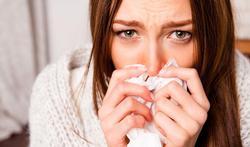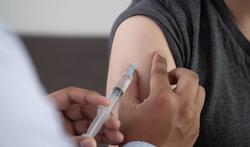Vaccination is the only way to protect you against the flu and especially its consequences. Flu is a highly contagious disease that reappears every year during the winter period. Every winter on average about one in ten people get the flu. They usually heal automatically after a few days, but in some people the flu can have serious consequences. Hundreds of people die each year as a result of the flu.
If you are vaccinated, the chance that you will get the flu is much smaller. If you do get the flu, you will become less sick and the risk of complications such as pneumonia is also much smaller. Moreover, it reduces the chance of your "own" disease getting worse (for example, disruption of your diabetes).
Who can best be vaccinated against the flu?
The flu shot is strongly recommended to anyone at extra risk of becoming seriously ill due to flu and to people who can infect sensitive people. Those are:
- Pregnant women who are in the second or third trimester of their pregnancy at the time of the flu season.
- Everyone from the age of 6 months with:
- a heart disease
- a lung disease such as severe asthma or COPD,
- a liver or kidney disease
- diabetes,
- a chronic muscle disease
- reduced resistance due to other diseases or due to medical treatment
- anyone older than 65 years
- anyone who has been admitted to a residential care center or hospital
- all people who live under the same roof as the above-mentioned risk persons or care for children younger than 6 months.
- All persons working in the health sector
Vaccination can also be useful for healthy people from 50 years of age, even if they do not suffer from a risk disorder. In addition to the increased risk that they develop complications in influenza due to their age, there is also one chance in three that they show at least one factor that increases the risk of complications. This mainly concerns people who smoke, drink excessively and / or are obese (BMI> 30). Discuss that with your doctor.
When should I get vaccinated?
 It is best to be vaccinated between mid-October and mid-November. As long as the flu virus has not broken through, vaccination remains useful. The vaccine only protects after two weeks and is only good for one winter period.
So every year you have to get a flu vaccine again.
It is best to be vaccinated between mid-October and mid-November. As long as the flu virus has not broken through, vaccination remains useful. The vaccine only protects after two weeks and is only good for one winter period.
So every year you have to get a flu vaccine again.
How can I get vaccinated?
• Ask your doctor for a prescription. • Get the vaccine from your pharmacist. • Take it to your doctor as soon as possible and keep it in the middle of your fridge, otherwise it will be worthless • It is even better to collect the vaccine from the pharmacist just before you have an appointment with your doctor. • The flu vaccine is partially reimbursed for all risk groups and costs around 11 Euros. Many mutual health insurance companies offer extra discounts. For people living in a retirement home, the vaccine is free in Flanders from this year.
Do I have to get vaccinated if I was vaccinated last year?
The flu shot must be given annually because the flu viruses are constantly changing. Every year there are different flu viruses, so you can get flu again every year. That is why the flu vaccine has a different composition every year. This is tailored to the viruses that are expected to occur a lot in the coming winter. Moreover, the protection that the vaccine offers is only temporary. After half a year to a year, the protection is usually exhausted.
Do I have to get vaccinated if I had the flu last year?
Yes, because flu viruses are constantly changing, you can be infected every year with a different type of virus that you have not built up natural resistance to. That is why the flu vaccine has a different composition every year.
Do I have to get vaccinated if I have never had the flu?
Some people indeed rarely get flu, but never say "never." If you belong to one of the risk groups, you have the same chance of getting serious complications in the event of a flu as everyone else in that group. That is why it is advisable to get the flu shot every year, even if you have not had the flu for a few years. You may have been lucky in recent years, but you may come into contact with the flu virus this year.
I am pregnant, can I be vaccinated?
Yes, there are no known harmful effects of the annual flu shot for the unborn child. Moreover, vaccination is highly recommended if you are in the second or third trimester during the flu season. This in the first place to protect the health of the mother because the immunity during pregnancy naturally decreases. The chance of complications and a more serious course is therefore greater. In addition, a severe flu attack can also have adverse consequences for the health of the fetus.
I am breastfeeding, can I be vaccinated?
If you belong to one of the risk groups, you may be vaccinated, even if you are breast-feeding. The flu shot has no adverse consequences for your child.
Does the flu vaccine have any side effects?
 The first day you may have some pain, redness or a slight swelling at the site of the puncture (the upper arm). This will disappear automatically within one to two days. Complaints such as headache and fever are rare, but can occur. This happens especially with children who have not yet come into contact with a flu virus.
Allergic reactions are rare. People who are allergic to chicken protein must not be vaccinated. If you have an allergic reaction to a previous vaccination, it is best to first discuss this with your doctor or pharmacist.
The first day you may have some pain, redness or a slight swelling at the site of the puncture (the upper arm). This will disappear automatically within one to two days. Complaints such as headache and fever are rare, but can occur. This happens especially with children who have not yet come into contact with a flu virus.
Allergic reactions are rare. People who are allergic to chicken protein must not be vaccinated. If you have an allergic reaction to a previous vaccination, it is best to first discuss this with your doctor or pharmacist.
Can I get the flu through the flu vaccine?
A flu vaccine contains no live virus particles and therefore cannot cause flu. The syringe makes your body produce defensive substances, which sometimes gives rise to slight inconveniences, but it does not really make you sick. If you fall ill shortly after an influenza vaccination, you were probably already infected just before the injection or was it a different virus (which causes a cold for example).
Can I still get the flu after being vaccinated?
If you are vaccinated, you can still get the flu. For example if you were vaccinated too late. It takes two weeks for your body to make enough antibodies to protect you against the flu. So if you come into contact with the flu virus within those two weeks, you can still get the flu. In addition, the vaccine only protects against the flu viruses contained in the vaccine. If by chance a vaccine pops up that is not in the vaccine, you can still get sick. If your immune system is weakened due to illness or old age, or because you need to take certain medicines, it is possible that the vaccine is less effective and therefore less well protected. You can still get sick. But usually the consequences are less severe. Finally, the flu vaccine only protects against the flu and not against other viruses that can cause similar symptoms, such as a cold




